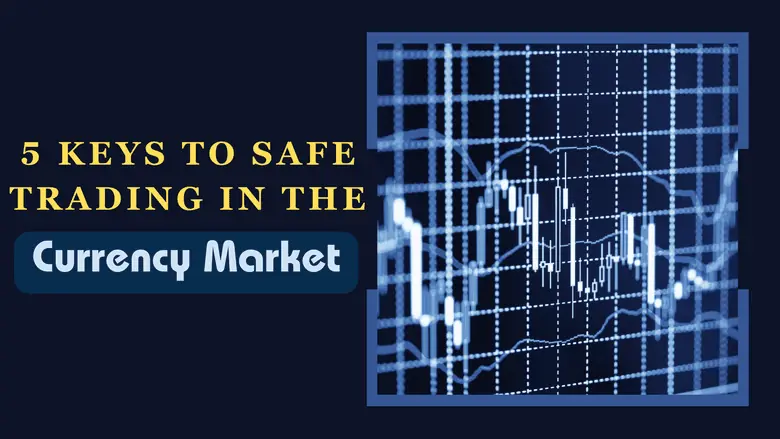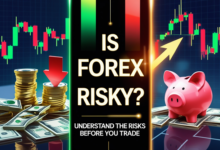5 Keys To Safe Trading In The Currency Market

The forex market is known as one of the largest financial markets globally due to its high trading volume. It operates on a decentralised system, allowing continuous transactions to occur across the globe. This also means the forex market is highly volatile, with prices fluctuating rapidly. However, the immense number of transactions happening in the forex market also contributes to its liquidity. If you are not familiar with this term, let me tell you that liquidity refers to how easily you can buy and sell assets without causing notable price movements.
The forex market’s high liquidity and volatility make it attractive to traders. However, it should be remembered the volatility of the forex market can lead to both profits and losses. The prices of currencies can change rapidly, presenting traders with the potential for high gains but also exposing them to risks. That’s exactly why risk management should be the top priority of a trader. Thankfully, tools like stop-loss orders, take-profit orders, risk/reward ratio calculators, profit calculator and other trading calculators are helpful in risk management. These tools allow you to protect your trades and ensure you are in a safe position. Mentioned below are five tips that will help you play safe in the forex market.
1. Start Small
Before starting with forex trading, starting small and gaining market experience is wise. Opening a demo or practice account is a great way to begin. This account allows you to trade with virtual money and get a feel for the market without risking your own capital. It’s like a training ground where you can learn and understand how the market works.
Using a demo account, you can explore different trading strategies, observe market trends, and familiarise yourself with various factors impacting your trading performance. It’s an opportunity to make mistakes and learn from them without incurring any real financial losses. Make use of a pip calculator to find out the number of pips you’d capture, and then try to capture the same amount of pips in demo trades. This will help overcome the anxiety of trading and make you more confident, which is quite important when trading a live account.
As you gain experience and knowledge about the market, you can make more informed decisions and aim to minimise potential losses. This helps you develop a safer position in the market, where you can protect your trading capital and gain an advantage over others.
2. Keep a Trading Log
In addition to monitoring the market and tracking your profit and loss, keeping a trading log is important. The trading log serves as a valuable tool to enhance your trading skills and maintain a sustainable position in the market.
A trading log involves recording all your trading activities, including the trades you executed, the outcomes, and the factors influencing those trades. By maintaining this log, you gain a deeper understanding of your trading strategies and their effectiveness.
When you review your trading log, you can identify patterns and trends. You can see which trades performed well and which ones missed the mark. Additionally, you can analyse the geopolitical situations, economic events, or market trends that influenced those trades. By considering these factors, you can fine-tune your strategies and make more informed decisions in the future.
Keeping a trading log also helps you avoid repeating past mistakes. By documenting your trades and their outcomes, you can identify any recurring errors or pitfalls that may have led to losses. This awareness allows you to adjust your approach and reduce the likelihood of repeating the same mistakes.
Furthermore, a trading log serves as a historical record of your trading journey. It provides you with a comprehensive overview of your progress, allowing you to track your growth and development as a trader over time.
3. Use Your Better Judgement
In the unpredictable forex market, it’s essential to rely on your better judgement. While the market can experience rapid price fluctuations that tempt you to deviate from your trading plans, it’s crucial to exercise caution and avoid being swayed by short-term trends. Making impulsive decisions based on temporary changes can jeopardise your overall trading goals.
To stay on track, it’s important to establish appropriate timeframes for your trades. This means setting realistic expectations and not expecting instant results. Forex trading is a long-term game, and success often comes from patiently sticking to your strategies and allowing them to unfold over time.
Additionally, it’s vital to trade only with the amount of money you can afford to lose because Forex trading is risky. You should trade according to your financial situation and set appropriate risk management measures in place. By trading within your means, you minimise the potential impact of losses on your overall financial well-being.
Remember, using your better judgement means making informed decisions based on careful analysis and understanding of the market dynamics. It’s important to rely on your research, knowledge, and experience rather than being swayed by short-lived market movements or following the crowd blindly.
4. Know Your Currency Pairs
It’s crucial to understand the currency pairs you trade in the forex market and the factors that can influence their value. Each country operates under a unique financial system, and economic conditions can vary significantly from one country to another. Changes in government policies, economic data releases, or geopolitical events can profoundly impact currency values, leading to sudden and significant price movements.
To be successful in trading, it’s important to familiarise yourself with the specific characteristics and market sentiments associated with the currencies you plan to trade. Stay informed about economic indicators, such as interest rates, inflation rates, employment data, and political developments that can impact the respective countries’ economies. This knowledge allows you to anticipate potential price fluctuations and adjust your trading strategies accordingly. It also helps you avoid surprises and better manage your risk exposure. You can test your knowledge on a demo account to build confidence in your skills. In fact, many novices start like that. They spend weeks on demo accounts before moving to live trading.
Keep in mind that the forex market is dynamic, and staying informed about the economic and political landscape of the countries involved can give you an edge in making profitable trades. Continuously educate yourself about the factors that influence currency values, and consider utilising reliable news sources, economic calendars, and analysis tools to enhance your understanding and decision-making capabilities.
5. Choose the Appropriate Stop-loss Levels
Selecting appropriate stop-loss levels is essential for protecting your trading account from significant losses in the currency market. It’s important to approach this task rationally and logically, considering various methods to determine the placement for your stop loss orders.
There are different approaches you can explore when setting your stop loss levels. It’s advisable to familiarise yourself with these methods and choose the one that resonates best with your trading style and risk tolerance. Some common techniques include using technical indicators, support and resistance levels, trend lines, or volatility-based calculations.
The forex market presents opportunities and risks, with its price fluctuations creating potential trading prospects. However, to navigate this market successfully, you need a comprehensive understanding of how it operates.
While you can gain knowledge through resources and educational materials, there are certain aspects of trading that can only be learned and experienced firsthand. The more time you spend actively trading and analysing the market, the better you will grasp its dynamics.
By adhering to safety rules, such as employing appropriate stop loss levels, you can establish a solid foundation for your trading journey. Remember to continuously enhance your trading skills, stay informed about market developments, and adapt your strategies as needed. With time and practice, you can improve your trading decisions and increase your chances of success in the exciting world of forex trading.
Final Thoughts
By following the steps outlined above, you can develop a structured approach to trading and enhance your skills as a trader. Trading is often considered an art form, and the key to improving your proficiency lies in consistent and disciplined practice. Remember that becoming a skilled trader is a journey that requires patience and perseverance. Stay committed to improving your skills, learn from successes and failures and adapt your approach as needed. With consistent practice and a disciplined mindset, you can progress as a trader and increase your chances of achieving long-term success in the dynamic world of trading.






